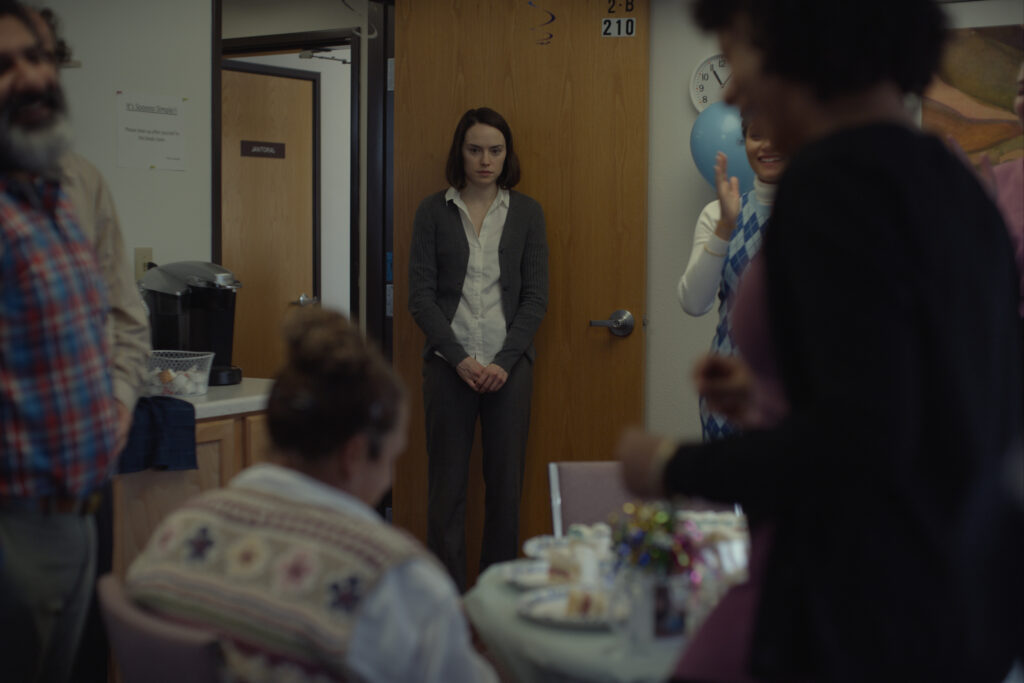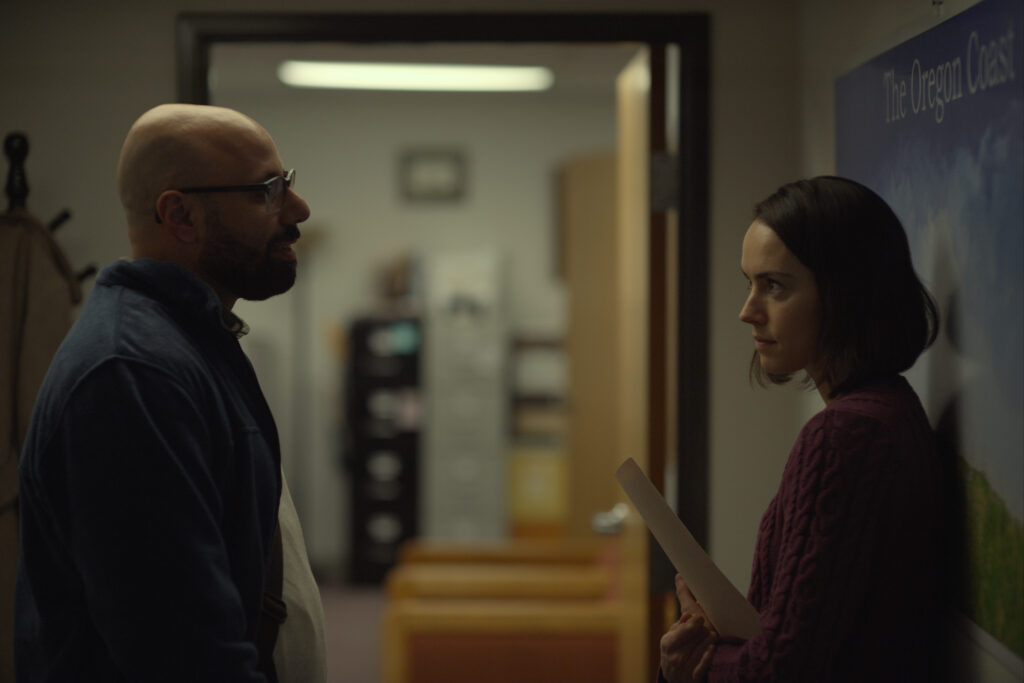January 26, 2024
by Carla Hay

“Sometimes I Think About Dying” (2024)
Directed by Rachel Lambert
Culture Representation: Taking place in Oregon, the dramatic film “Sometimes I Thing About Dying” features a predominantly white cast of characters (with a few African Americans and Asians) representing the working-class and middle-class.
Culture Clash: A very introverted woman with an almost non-existent social life has to decide how much she will open herself up to love when a co-worker begins courting her.
Culture Audience: “Sometimes I Think About Dying” will appeal primarily to people who are fans of star Daisy Ridley and low-key, independent films that have observations about loneliness and personality disorders.

“Sometimes I Think About Dying” is a unique portrait of social anxiety and depression. This quiet and slow-paced drama won’t appeal to everyone. However, viewers with the patience to watch the entire movie will see an interesting awakening in the painfully shy protagonist, who has to learn to get out of her head and experience more of life.
Directed by Rachel Lambert, “Sometimes I Think About Dying” is based on the 2019 short film of the same name. Stefanie Abel Horowitz, Kevin Armento and Katy Wright-Mead wrote the screenplays for both movies, but Horowitz directed the short film. The feature-length version of “Sometimes I Think About Dying” had its world premiere at the 2023 Sundance Film Festival. The movie was filmed in Oregon and the city of Longview, Washington.
In the feature-length “Sometimes I Think About Dying” (which takes place in an unnamed city in Oregon), the central character is Fran Larsen (played by Daisy Ridley), a depressed introvert whose life is a bland routine. Fran, who is in her late 20s, works at her office for a small business called CB Port Authority. Fran does administrative work (whatever she does in her job, she uses a lot of spreadsheets) in a non-descript cubicle. There are less than 15 people who work in this office. After her work shift, Fran usually just goes home to her modest house and doesn’t communicate with anyone.
Fran has a secret interior life where she thinks about scenarios in which she is dying or is already dead. The movie is punctuated with glimpses of these morbid fantasies. In one scenario, a snake is on the floor in the office, with Fran’s back to the snake, as if she’s unaware that the snake could pounce at any moment. In another scenario, Fran is a corpse on a beach. In another scenario, she’s dead in a wooded area.
Fran is very shy and keeps mostly to herself at work. In the beginning of the movie, a co-worker named Carol (played by Marcia DeBonis) is retiring, so the co-workers have gathered in the break room for Carol’s going-away party. Carol gives away some of her office supplies and says in a gloating voice, “I’m going on a cruise!” In a retirement greeting card signed by all the co-workers, Fran’s written message inside the card is a very basic “Happy retirement.”
Other people who work in the office are cheerful supervisor Isobel (played by Megan Stalter), nerdy Sean (played by Sean Tarjyoto), eccentric Doug (played by Jeb Berrier), self-assured Garrett (played by Parvesh Cheena) and eager intern Sophie (played by Brittany O’Grady). After Carol now longer works at the company, the dynamics in the office change with the arrival of Robert (played by Dave Merheje), who is Carol’s replacement.
Robert, who is in his late 30s or early 40s, seems to be almost immediately attracted to Fran, who is slow to pick up the social cues that Robert wants to start a conversation to get to know her better. In text messages, Robert asks Fran some questions about office supplies. He confesses that he’s never had a job before. Most people would be curious to know why, but Fran doesn’t ask.
Eventually, Robert establishes a little bit of rapport with Fran when they find out that they both like cottage cheese. Fran shows she can be nitpicky when she corrects Robert and says that cottage cheese is technically not cheese. “It’s a curd. I Googled it,” she states matter-of-factly.
Robert asks Fran out on a date. She says yes. Robert and Fran see a movie and then have dinner on this first date. Over dinner at a restaurant, Robert says he’s a big fan of movies, and he liked the film that they saw. Fran admits she didn’t like the film.
The waitress who serves them at the restaurant is named Amelia. She invites Robert and Fran to a small get-together that she has on Saturdays. It turns out to be a murder mystery game, which is somewhat ironic because Fran spends a lot of time thinking about herself dying in gruesome ways.
It’s very difficult for Fran to open up about herself to anyone. The most that she will tell Robert is that she grew up in Hawaii, she likes to cook, and she’s never been in love. Meanwhile, Robert tells her that he’s been divorced twice and that he hasn’t figured out marriage yet.
“Sometimes I Think About Dying” doesn’t have a big, sweeping plot. There are several scenes in the movie that show how isolated Fran is when she’s at home. And even when she’s with people (such as in her office job), she still seems very alone because she’s lost in her thoughts and not sociable. She’s not rude, but she doesn’t seek out people’s company, and she rarely initiates conversations with other people.
“Sometimes I Think About Dying” does not follow a predictable formula that’s usually in movies about lonely single people, so this film will simply be too boring for some viewers. However, Ridley gives a very good depiction of how people who feel invisible (by choice or by circumstance) often behave. This is not a typical story where someone is going to swoop in and “rescue” Fran from her social anxiety. Instead, the movie excels at showing in nuanced ways how human connections can be terrifying to people who are also afraid to confront their own insecurities.
Oscilloscope Laboratories released “Sometimes I Think About Dying” in select U.S. cinemas on January 26, 2024.




